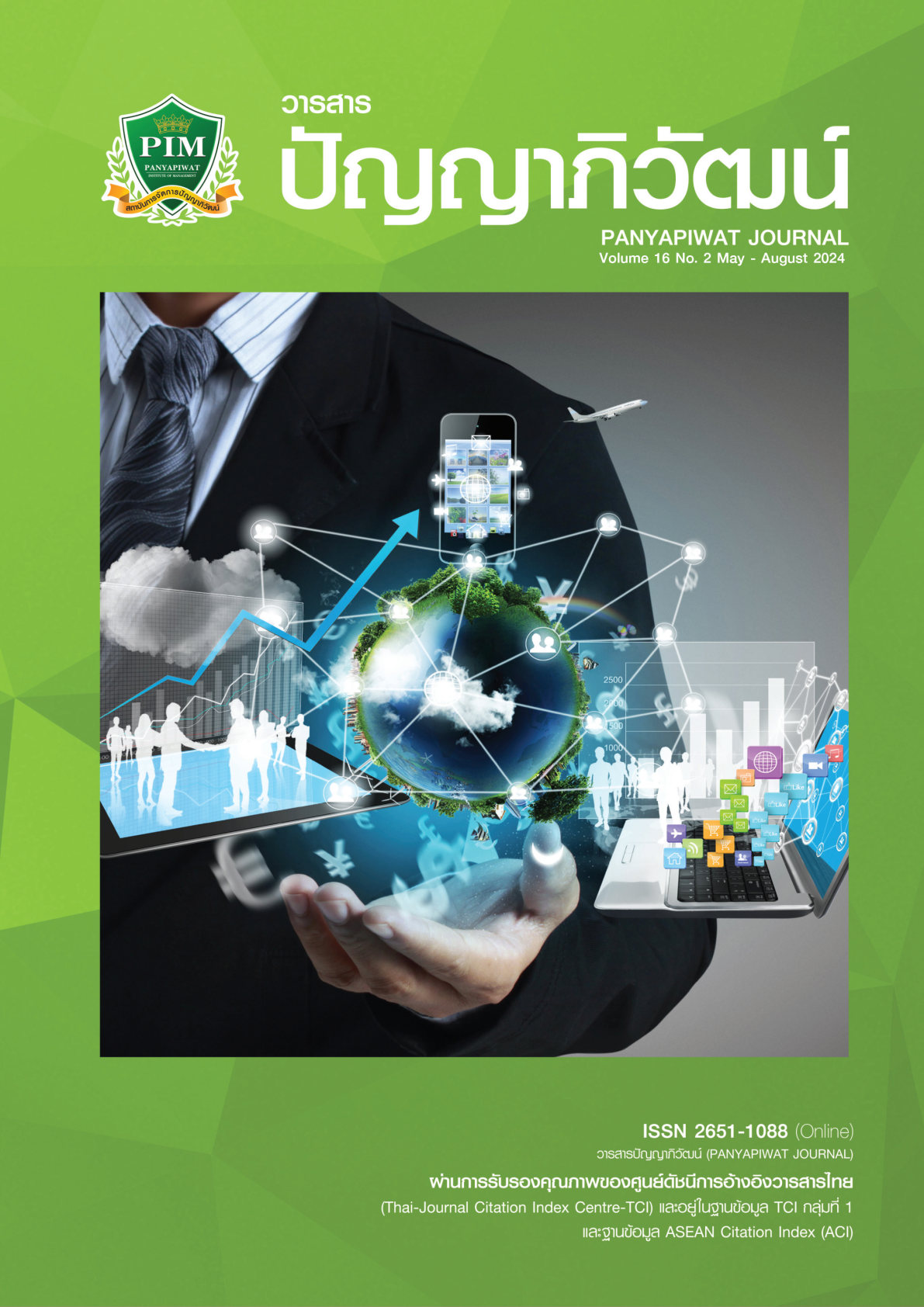การพัฒนาความสามารถของครูในการจัดการเรียนรู้เพื่อพัฒนาทักษะที่จำเป็นต่อชีวิตของนักเรียนในศตวรรษที่ 21 ผ่าน E-Training Platform for Teacher Capacity Building
Main Article Content
บทคัดย่อ
งานวิจัยนี้มีวัตถุประสงค์เพื่อ 1) ประเมินความต้องการจำ เป็นในการพัฒนาความสามารถของครูในการจัดการเรียนรู้เพื่อพัฒนาทักษะศตวรรษที่ 21 ที่จำ เป็นต่อชีวิตของนักเรียนในระดับการศึกษาขั้นพื้นฐาน 2) สร้าง E-Training Platform for Teacher Capacity Building ที่สร้างเสริมความสามารถของครูในการจัดการเรียนรู้เพื่อพัฒนาทักษะศตวรรษที่ 21 ที่จำ เป็นต่อชีวิตของนักเรียนในระดับการศึกษาขั้นพื้นฐานและ 3) ศึกษาผลของ E-Training Platform for Teacher Capacity Building ที่มีต่อความสามารถของครูในการจัดการเรียนรู้เพื่อพัฒนาทักษะศตวรรษที่ 21 ที่จำ เป็นต่อชีวิตของนักเรียนในระดับการศึกษาขั้นพื้นฐานการวิจัยแบ่งออกเป็น 3 ระยะ ดังนี้ 1) ประเมินความต้องการจำ เป็นในการพัฒนาความสามารถของครู ในการจัดการเรียนรู้เพื่อพัฒนาทักษะที่จำเป็นต่อชีวิตของผู้เรียนในศตวรรษที่ 21 กลุ่มตัวอย่างคือครู ผู้อำนวยการสถานศึกษา รองผู้อำ นวยการสถานศึกษา ศึกษานิเทศก์ และนิสิตฝึกประสบการณ์วิชาชีพครู รวม 11,077 คนใช้วิธีการสุ่มแบบชั้นภูมิ 2) สร้าง E-Training Platform และหลักสูตรฝึกอบรมจากการนำ ข้อมูลที่ได้จากระยะที่ 1 มายกร่างกรอบหลักสูตรโดยใช้การศึกษาเอกสารและจากนั้นนำ ไปทดลองใช้กับกลุ่มตัวอย่างครูจำนวน 1,742 คน ที่สมัครเข้ารับการอบรมการประชุมวิชาการคุรุสภา ประจำ ปี 2564 และนำข้อมูลที่ได้มาปรับปรุงและพัฒนา E-Training Platform เพื่อนำ ไปทดลองใช้ และ 3) ทดลองและศึกษาผลการทดลองใช้E-Training Platform กับครู ผู้บริหารสถานศึกษา และศึกษานิเทศก์ รวม 309 คน จาก 12 โรงเรียน
ผลการวิจัยพบว่า ครูมีความต้องการจำ เป็นได้รับการส่งเสริมให้สามารถฝึกให้ผู้เรียนถ่ายทอดความรู้ความเข้าใจและประยุกต์ใช้องค์ความรู้ในรายวิชาที่สอนในรูปแบบสื่อดิจิทัล เช่น แอนิเมชันสูงที่สุด (PNImodified= .45) E-Training Platform ในการพัฒนาครูประกอบด้วยโครงสร้างเนื้อหาจำ นวน 10 โมดูล และผลจากการทดลองใช้ E-Training Platform และหลักสูตรฝึกอบรมพบว่า ผู้เข้าอบรมมีความสามารถในการจัดการเรียนรู้เพื่อพัฒนาทักษะที่จำ เป็นต่อชีวิตของผู้เรียนในศตวรรษที่ 21 สูงขึ้นอย่างมีนัยสำ คัญทางสถิติที่ระดับ .01 และผู้เข้าอบรมมีความพึงพอใจด้านระบบของหลักสูตร ด้านการอบรมในภาพรวมและด้านการอบรมจำแนกตามโมดูลในระดับมากในทุกประเด็น
Article Details

อนุญาตภายใต้เงื่อนไข Creative Commons Attribution-NonCommercial-NoDerivatives 4.0 International License.
“ข้าพเจ้าและผู้เขียนร่วม (ถ้ามี) ขอรับรองว่า บทความที่เสนอมานี้ยังไม่เคยได้รับการตีพิมพ์และไม่ได้อยู่ระหว่างกระบวนการพิจารณาลงตีพิมพ์ในวารสารหรือแหล่งเผยแพร่อื่นใด ข้าพเจ้าและผู้เขียนร่วมยอมรับหลักเกณฑ์การพิจารณาต้นฉบับ ทั้งยินยอมให้กองบรรณาธิการมีสิทธิ์พิจารณาและตรวจแก้ต้นฉบับได้ตามที่เห็นสมควร พร้อมนี้ขอมอบลิขสิทธิ์บทความที่ได้รับการตีพิมพ์ให้แก่สถาบันการจัดการปัญญาภิวัฒน์หากมีการฟ้องร้องเรื่องการละเมิดลิขสิทธิ์เกี่ยวกับภาพ กราฟ ข้อความส่วนใดส่วนหนึ่งและ/หรือข้อคิดเห็นที่ปรากฏในบทความข้าพเจ้าและผู้เขียนร่วมยินยอมรับผิดชอบแต่เพียงฝ่ายเดียว”
เอกสารอ้างอิง
Buasuwan, P., Suebnusorn, W., Butkatunyoo, O., Manowaluilou, N., Kaewchinda, M., Lalitpasan, U., Srilapo, N., Sarnswang, S., Suksiri, W., Wiboonuppatham, R., & Sripongpank, S. (2022). Re-envisioning a “skills framework” to meet 21st century demands: What do young people need? Frontiers in Education, 7, 1004748. https://doi.org/10.3389/feduc.2022.1004748
Buasuwan, P., Suebnusorn, W., Lalitpasan, U., Butkatunyoo, O., Manowaluilou, N., Srilapo, N., Sarnswang, S., Kaewchinda, M., Suksiri, W., Wiboonuppatham, R., & Sripongpankul, S. (2022). Research report on skills framework in 21st century and e-training platform for teacher capacity building in teaching and learning of essential skills for students in basic education: Development and guidelines for implementation. Faculty of Education, Kasetsart University. [in Thai]
Calton, C. (2022). Universal design for learning and eLearning. https://www.accessibility.com/blog/universal-design-for-learning-and-elearning
Christensen, B. D. (2018). From needs assessment to needs analysis. International Society for Performance Improvement, 57(8), 36-44. https://doi.org/https://doi.org/10.1002/pfi.21785
Chu, S. K. W., Reynolds, R. B., Tavares, N. J., Notari, M., & Lee, C. W. Y. (2017). Assessment instruments for twenty-first century skills. In S. K. W. Chu, R. B. Reynolds, N. J. Tavares, M. Notari, & C. W. Y. Lee (Eds.), 21st century skills development through inquiry-based learning: From theory to practice (pp. 163-192). Springer Singapore. https://doi.org/10.1007/978-981-10-2481-8_8
Ezquerra, A., De-Juanas, A., & Ulloa, C. S. M. (2014). Teachers’ opinion about teaching competences and development of students’ key competences in spain. Procedia-Social and Behavioral Sciences, 116, 1,222-1,226. https://doi.org/https://doi.org/10.1016/j.sbspro.2014.01.372
Fakkao, S., & Signharaj, A. (2020). Teacher as instructional designer in 21st century. Panyapiwat Journal, 12(2), 302-315.
Fleming, T. (2018). Critical theory and transformative learning: rethinking the radical intent of mezirow’s theory. International Journal of Adult Vocational Education and Technology, 9(3), 120-136.
Hoi, P. T. T., Bao, D. Q., Nghe, P. K., & Nga, N. T. H. (2018). Developing problem-solving competency for students in teaching biology at high school in vietnam. American Journal of Educational Research, 6(5), 539-545. https://doi.org/10.12691/education-6-5-27
Hord, S. M., Roussin, J., & Sommers, W. A. (2009). Guiding professional learning communities: Inspiration, challenge, surprise, and meaning. Corwin.
Hord, S. M., Roussin, J. L., & Sommers, W. A. (2010). Guiding professional learning communities: Inspiration, challenge, surprise, and meaning. Corwin.
Kim, S., Raza, M., & Seidman, E. (2019). Improving 21st-century teaching skills: The key to effective 21st-century learners. Research in Comparative and International Education, 14(1), 99-117. https://doi.org/10.1177/1745499919829214
Kolb, A. Y., & Kolb, D. A. (2017). Experiential learning theory as a guide for experiential educators in higher education. A Journal for Engaged Educators, 1(1), 7-44. https://nsuworks.nova.edu/cgi/viewcontent.cgi?article=1000&context=elthe
Lamb, S., Maire, Q., & Doeck, E. (2017). Key skills for the 21st century: an evidence-based review. https://prod65.education.nsw.gov.au/cotent/dam/main-education/teaching-andlearning/education-for-a-changingworld/media/documents/Key-Skills-for-the-21stCentury-Executive-Summary.pdf
Newell, G. (2023). What’s an “educational ecosystem” and are you in one? https://blog.irisconnect.com/uk/blog/whats-an-educational-ecosystem-and-are-you-in-one
OECD. (2019). Future of education and skills 2030: Curriculum analysis. https://one.oecd.org/document/EDU/EDPC(2019)16/en/pdf
Romiszowski, A. (2009). Fostering skill development outcomes. In C. M. Reigeluth & A. A. Carr-Chellman (Eds.), Instructional design theories and models: Building a common knowledge base (pp. 199-224). Routledge.
Sawasdee, A., Hasin, S., & Sukkananchana, K. (2022). Learning ecosystem guideline in school for active learning. E-Journal of Education Studies, Burapha University, 4(4), 67-78. [in Thai]
Toffler, A. (1970). Future shock. Random House. https://cdn.preterhuman.net/texts/literature/general/Alvin%20Toffler%20-%20Future%20Shock.pdf
Vélez-Agosto, N. M., Soto-Crespo, J. G., Vizcarrondo-Oppenheimer, M., Vega-Molina, S., & García Coll, C. (2017). Bronfenbrenner’s bioecological theory revision: Moving culture from the macro into the micro. Perspectives on Psychological Science, 12(5), 900-910. https://doi.org/10.1177/1745691617704397
Wannapirun, P. (2011). Blended learning: Principles into practice. Journal of Vocational and Technical Education, 1(2), 43-49. https://ojs.kmutnb.ac.th/index.php/JVTE/article/view/1679 [in Thai]
Wongwanich, S. (2019). Needs assessment research. Chulalongkorn University Press. [in Thai]


